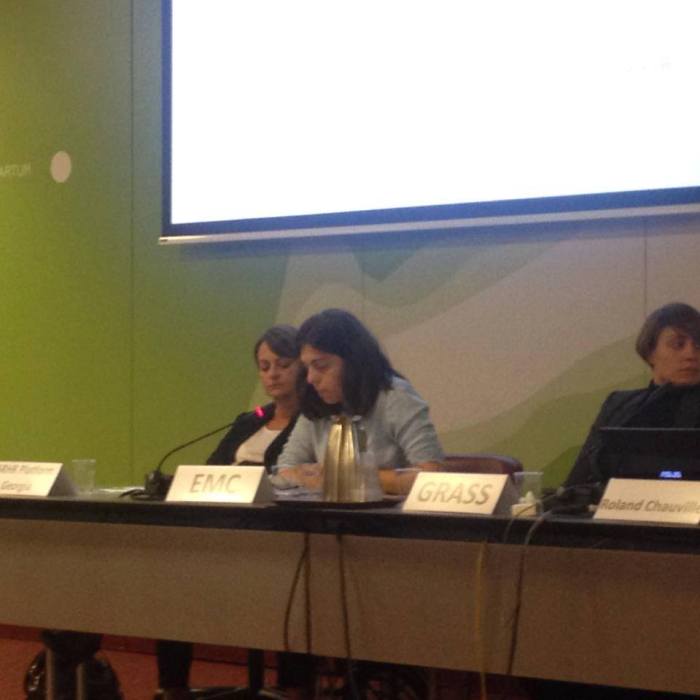საერთო ცხელი ხაზი +995 577 07 05 63

 Geneva, 2015
Geneva, 2015By Sopho Verdzeuli
I represent the “Human Rights Education and Monitoring Center (EMC),” a non-governmental organization based in Tbilisi, Georgia. My speech focuses on the judiciary and law enforcement agencies for the “Coalition for Independent and Transparent Judiciary” and religious freedom for EMC.
Despite some recent improvements, concerns remain over the independence, impartiality and political neutrality of the Georgian judicial system. Concerns also remain over the qualifications of judges and lack of sensitivity towards certain groups.
Despite the criticism of the Venice Commission the government went ahead and implemented a three-year probation period for newly appointed judges. This impedes the independence of judges, transparency in the appointment process and weakens confidence in the judicial system.
We recommend the Government:
Despite recent reforms, deep concerns remain over the independence and political neutrality of law enforcement agencies, including the Prosecution, Police and Security forces. The main challenge in this regard is the low autonomy and high risk of political influence over these forces, as is apparent in their actions.
For example, in numerous cases, especially during the run up to elections, the law enforcement agencies were involved in politically motivated violations, such as arbitrary arrests, detention and intimidation. As such many of their activities were perceived as politically motivated. As a result societal trust in the system remains extremely low.
In addition, lack of effective institutional mechanisms encourages violations and abuse of power. This is aggravated by the impunity of law enforcement agencies.
We recommend the Government:
Despite previously accepting UPR recommendations on religious freedom, the Government has refused to implement them. Challenges still remain including the non-secular financing of the Orthodox Christian Church, discriminatory legislations, ineffective investigation of religious intolerance crimes, the problem of restituting the assets confiscated during the Soviet Era, and the intolerant and discriminatory environment in public schools.
The government fails to distance itself from the Church, which increases Church’s dominance on political and public processes and essentially hinders equal policies and practices towards different minority groups including religious organizations, women, LGBT community and other vulnerable groups.
Since the government transition in 2012, the situation has worsened. For example, there have been numerous cases of religious violence. In all cases state actions were ineffective. Police either acted as a passive observer and failed to react in a timely and effective manner, or repressed religious minorities and used excessive and disproportionate force against them.
To respond to these challenges the government established a State Agency on Religious Affairs, which distributes finances and material goods to four religious denominations. This practice creates a control mechanism over these four religious groups. It is apparent that the government views religious and ethnic minorities as a security risk.
The model of direct financing grants absolute privileges to the Orthodox Church. In 2014, the Government started compensating the Islamic, Judaic, Roman Catholic, and Armenian Apostolic Confessions for the damages suffered during the Soviet Period. However, this compensation which involves direct funding violates the principle of secularism and discriminates against other religious groups by failing to include them.
Indoctrination, proselytism and discrimination in public schools also remain a systemic challenge. The educational system fails to ensure secularism, equality and multiculturalism.
EMC recommends the Government:
The website accessibility instruction